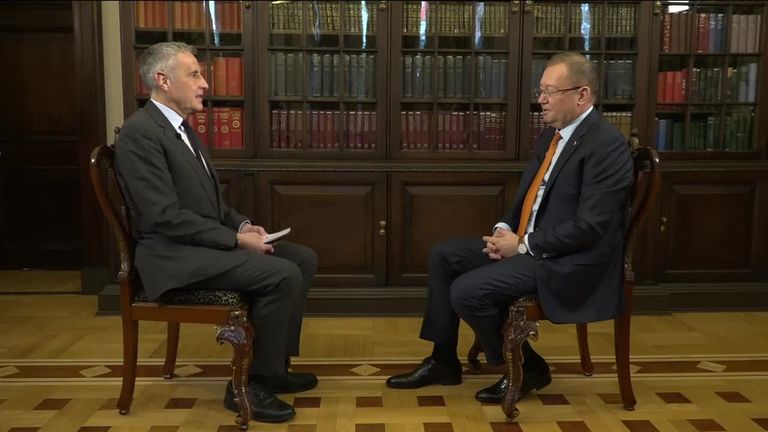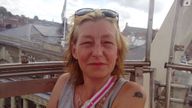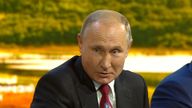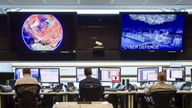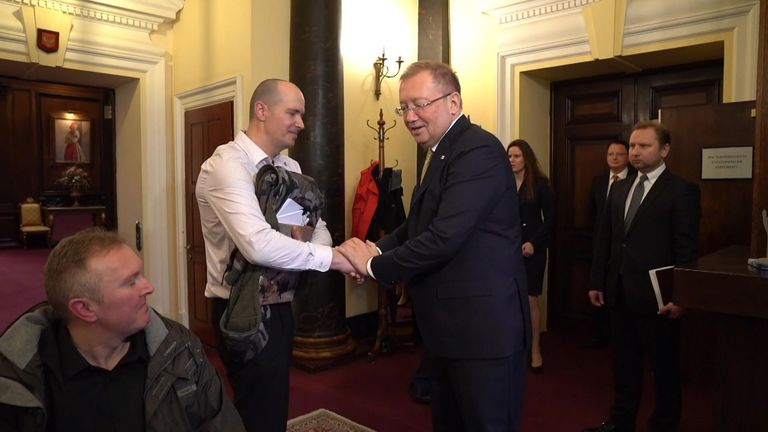UK never asked to interview Salisbury suspects, claims Russian ambassador
In a wide-ranging interview, Alexander Yakovenko says Russia "simply does not understand the position of the British government".
Tuesday 9 April 2019 17:07, UK
Russia's ambassador to the UK claims the British government never asked to interview the Salisbury attack suspects - and that a request would have been considered.
Alexander Yakovenko, who spoke to Sky News days after meeting novichok victim Charlie Rowley, also revealed he wants his country to do a trade deal with Britain when the UK leaves the EU.
Asked to respond to the fact two Russian GRU agents were in Salisbury at the exact time of the nerve agent attack, Mr Yakovenko said that it is "the story of the British press and also the government but unfortunately it is not supported by the facts".
Attempting to support his claims, he cited the interview on Russian television with suspects Anatoliy Chepiga and
Alexander Mishkin who said "officially" they are not members of the GRU.
He continued: "The British side could have an opportunity to question them but they were never asked for that. If the Russian side had been asked for that, we were happy to consider.
"We were ready to consider but the request never appeared. There was no request. Why?"
Asked why he thought no request had come, Mr Yakovenko laughed and said: "I don't know. The people, these two people, they said on the Russian TV officially they had nothing to do with this Salisbury case. That was their statement.
"They also said officially they have nothing to do with the GRU.
"On the British side they refused to co-operate with Russia on anything in Salisbury so we simply do not understand the position of the British government."
The ambassador alleged that the investigative journalism site Bellingcat, which first revealed the identities of Chepiga and Mishkin, is linked to British intelligence. He provided no evidence for his claims.
Regarding the nerve agent being developed in Russia, Mr Yakovenko replied: "There is no proof of that it was developed in the Russian labs."
He implied that Russia was being blocked from seeing Sergei and Yulia Skripal, the Russian double agent and his daughter who were targeted in the attack.
"They are Russian citizens… under the Vienna convention we are allowed and we have the right to see them. Almost a year passed and we didn't have a chance to meet them. Why?" he said.
Asked if they had made requests, he laughed and said "dozens".
A Foreign and Commonwealth Office spokesperson said: "Only Russia had the technical means, operational experience and motive to carry out the attack in Salisbury last March. There has been a thorough police investigation into the Salisbury attack, and two Russian nationals have been charged with conspiracy to murder, attempted murder, causing grievous bodily harm and the use and possession of novichok.
"Based on a body of intelligence, the government has concluded that the two individuals named by the police and CPS are officers from the Russian military intelligence service, also known as the GRU."
The spokesperson added: "As the Russian ambassador is aware, the Russian constitution forbids the extradition of Russian citizens to face criminal charges overseas. However if either of the two individuals charged in this case travel outside of Russia, we will make every effort to ensure that they are brought to the UK to face justice in a British court. The UK has repeatedly asked Russia to account for what happened in Salisbury in March last year, and they have replied with obfuscation and lies."
Speaking about the meeting with Mr Rowley, who admitted he "didn't really get any answers", Mr Yakovenko said he agreed to meet with Mr Rowley to put across Russia's side of what happened.
"Charlie was really surprised to hear a lot of things. 80% of what I said to him, he never heard," the ambassador said.
The diplomat said that a year passed and "that we don't have any official report of the investigation… and we are still waiting for that report."
He also said he showed Mr Rowley dozens of diplomatic notes sent to the British Foreign Office which he says were not responded to.
Regarding the UK's broader relationship with Russia, Mr Yakovenko said it was thawing but there was some way to go, especially in the matters of Syria, Ukraine and Salisbury.
He indicated that Russia would consider a trade deal, saying: "We are open for co-operation."
Russia has been accused of interfering with the UK's 2016 EU referendum, which the ambassador denied.
Despite 13 Russians being indicted in America over interference in the 2016 presidential election, the ambassador said claims of involvement are "also fake" and that he wants to read Robert Mueller's report.
